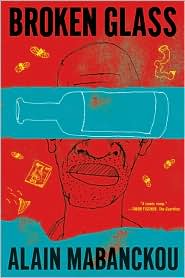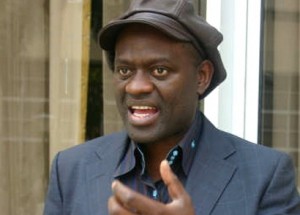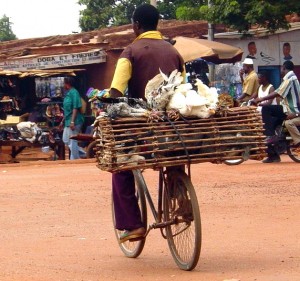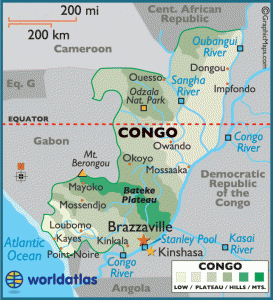“what I really want people to say when they read me is ‘what’s this empire of signs, this chit-chat, this descent to the dregs of belles-letters…is this stuff for real, and where does it start, and where the hell does it end?’ and my mischievous answer would be ‘this jumble of words is life, come on, come into my lair, check out the rotting garbage….”—Broken Glass, chronicler of Credit Gone West.
Alain Maba nckou, a Congolese author who now teaches French literature at UCLA, writes an often hilarious, non-stop narrative full of life and excitement, a narrative which, at the same time, is also mordant in its depictions of life. His story, much like life itself, is one constantly unreeling narrative in which there are no periods, the only words deserving of capital letters being names and places. Unlike the more “literary” stream of consciousness novels with which we are more familiar, this one is so unpretentious, so natural, and so conversational that the reader never has to stop to puzzle about where ideas begin and end or what the author might mean.
nckou, a Congolese author who now teaches French literature at UCLA, writes an often hilarious, non-stop narrative full of life and excitement, a narrative which, at the same time, is also mordant in its depictions of life. His story, much like life itself, is one constantly unreeling narrative in which there are no periods, the only words deserving of capital letters being names and places. Unlike the more “literary” stream of consciousness novels with which we are more familiar, this one is so unpretentious, so natural, and so conversational that the reader never has to stop to puzzle about where ideas begin and end or what the author might mean.
The main character, a Congolese alcoholic named Broken Glass, is memorializing the sad stories of his fellow patrons of a bar called Credit Gone West in the beachfront city of Pointe Noire in the Republic of Congo. A teacher, until he was accused of pedophilia for drunkenly baring his buttocks to his class, Broken Glass has traveled the world through books, loving the adventures of Tarzan, Tintin, and Santiago the fisherman, while he was a child, and then going on to study and enjoy the French classics. Ultimately he tells the “civilized” literary world that “Until the day your characters start to see how the rest of us earn our nightly crust, there’ll be no such thing as literature.”

Stubborn Snail, the hard-working proprietor of the bar, has asked the sixty-four-year-old Broken Glass to record and pass on the history of Credit Gone West. When Broken Glass demurs, Stubborn Snail tells him, “I’ve tried it a few times myself, but it never works out, I just don’t have that little bug that writers have, that you have, it shows when you talk about literature, your eyes light up and you look all wistful, but I don’t think it’s frustration, or bitterness either…” The Snail also wonders “whether you didn’t start drinking in imitation of the writer whose name I’ve forgotten…a famous writer who drank like a fish.”

"Bicycle Chicken," an image which reappears throughout this book
Given a notebook by Stubborn Snail so he can record his thoughts, Broken Glass is allowed to stay at the bar as long as he wants, writing, and he is supplied with the red wine on which he depends. Neither he nor the Stubborn Snail believes the old African saying that “when an old person dies, a library burns.” As the Snail says, “depends which old person, don’t talk crap, I only trust what’s written down.” Broken Glass’s stream-of-consciousness vignettes of the bar’s patrons unfold at their own pace. The Printer, who has “done France,” now regards his white wife in Paris as a witch because she betrayed him. Mama Mfoa, “the bald soprano,” runs a “bicycle chicken” shop near the bar, where the barbecue may be cats or dogs, and Mouyeki, a sorcerer/swindler, claims that he can perform better miracles than Christ. Eventually, the reader learns the sad stories of Broken Glass and the Stubborn Snail, from which they have recovered in varying degrees.

Slangy, funny, and filled with unique observations, Broken Glass’s story reveals much about his society and about himself. Mompero, the bartender, for example, “has a face of stone, eyebrows like a circumflex, lips like a sink plunger,” while the other bartender, Dengaki, is “more skillful with a knife than a butcher turned serial killer.” The customs of the country and its traditions—death announcements and the aftermath, for example—come to life in juxtaposition with Broken Glass’s highly literate references throughout the novel to France’s most notable literary achievements, references so natural that they become the speaker’s “throw-aways.” His commentary on dysfunctional politics, about the Congo’s French colonial heritage, and about the regular betrayal of men by women is integrated into the little life stories of his bar-companions to give a broad picture of the society as they see it. Broken Glass has learned to make the best of what life offers and not to expect more—at least no more than can be found in the bottom of a bottle. Literate, perceptive, and filled with unique observations, Broken Glass is one of the rare novels which can find moments of great humor in stories of otherwise overwhelming sadness.
Notes: The author’s photo is from http://lailalalami.com
The photo of “bicycle chicken,” to which there are numerous references in the novel: www.trekearth.com. This is often tough, free-range chicken, which nevertheless arrives alive at the market. It is different from “television chicken,” which is frozen chicken, sometimes thawed and spoiled, which is then cooked in a microwave.
Pointe Noire is in the Republic of Congo, as opposed to the larger Democratic Republic of Congo, formerly Zaire: http://www.worldatlas.com
An analysis of Mabanckou’s fiction may be found here: http://www.economist.com
